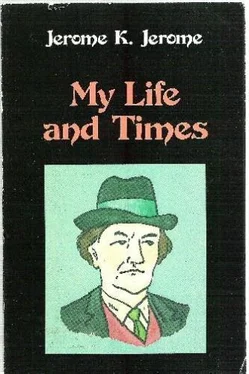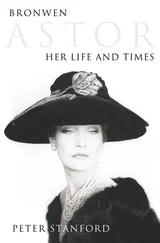A few hundreds, all told, were perhaps saved out of the wreck. We moved into a small house in Stourbridge, near by; and, having settled us there, my father, ever hopeful to the end, went off by himself to London, with the idea of retrieving our fortunes through the medium of the wholesale ironmongery business. He seems to have taken premises with a wharf in Narrow Street, Limehouse, and at the same time to have secured by way of residence the lease of a small house in Sussex Street, Poplar. He describes it, in his letters, as a corner house with a garden; and my mother seems to have pictured it as something rural. Poor Lady! It must have been a shock to her when she saw it. Sometimes, when in the neighbourhood of the City, I jump upon an East Ham 'bus and, getting off at Stainsby Road, creep to the corner and peep round at it. I can understand my father finding one excuse after another for not sending for us. Of course he was limited by his means and the wish to be near his place of business in Narrow Street. Also, no doubt, he argued to himself that it would only be for a little while—until he could afford one of the fine Georgian houses in the East India Dock Road, where then lived well-to-do ship-owners and merchants. There, till we joined him, two years later, my father lived by himself, limiting his household expenses to five shillings a week. For the ironmongery business was not prospering; and at Stourbridge there were seven of us, in all, to be kept. My mother did not know at the time—not till a friend betrayed him to her and then she took matters into her own hands, and began her packing.
But before that, a deeper trouble than any loss of money had all but overwhelmed her. My little brother Milton had died after a short illness when six years old. A dear quaint little fellow he seems to have been: though maybe my mother's love exaggerated his piety and childish wisdom. On each anniversary of his death, she confides to her diary that she is a year nearer finding him again. The last entry, sixteen years afterwards and just ten days before she died herself, runs: “Dear Milton's birthday. It can be now but a little while longer. I wonder if he will have changed.”
My brother's death left a gap in the family. My younger sister, Blandina, was eleven years older than myself; and Paulina, the elder, was a grown-up young woman with a Sunday School class and a sweetheart when I was still in frocks. The sweetheart was one Harry Beckett, an engineer. My mother at first entertained hopes of his conversion; but later seems to have abandoned them on learning that he had won in open competition the middleweight championship of Staffordshire. She writes him down sorrowfully as “evidently little better than a mere prize fighter,” and I gather there were other reasons, rendering him undesirable from my parents' point of view. The end, I know, was tears; and Harry departed for Canada. He turned up again in the eighteen eighties and dropped in unexpectedly upon my sister. I happened to be staying with her at the time. She was then the mother of seven hefty boys and girls. A big handsome fellow he was still, with laughing eyes and kindly ways, I had taken to the writing of stories and was interested in the situation. He was doing well in the world; but he had never married. Perhaps he did mix his whisky and water with less water than there should have been as we sat together in the evening, we three—my brother-in-law was away up north on business—but as I watched them, I could not help philosophising that life will always remain a gamble, with prizes sometimes for the imprudent, and blanks so often to the wise.
It is with our journey up to London, when I was four years old, that my memory takes shape. I remember the train and the fields and houses that ran away from me; and the great echoing cave at the end of it all—Paddington station, I suppose. My mother writes that the house was empty when we reached it, the furniture not turning up till four days later. “Papa and I and Baby slept in the house.” There must, of course, have been a little furniture, for my father had been living there. I remember their making me up a bed on the floor. And my father's and mother's talk, as they sat one each side of the fire, mingled with my dreams. “Mrs. Richard put up the two girls, and Fan and Eliza slept at the Lashfords'.” Eliza, I take it, must have been a servant. Aunt Fan was my mother's sister who lived with us: an odd little old lady with corkscrew curls and a pink-and-white complexion. The pictures of Queen Victoria as a girl always remind me of her.
My recollections are confused and crowded of those early days in Poplar. As I grew older I was allowed to wander about the streets a good deal by myself. My mother was against it, but my father argued that it was better for me. I had got to learn to take care of myself.
I have come to know my London well. Grim poverty lurks close to its fine thoroughfares, and there are sad, sordid streets within its wealthiest quarters. But about the East End of London there is a menace, a haunting terror that is to be found nowhere else. The awful silence of its weary streets. The ashen faces, with their lifeless eyes that rise out of the shadows and are lost. It was these surroundings in which I passed my childhood that gave to me, I suppose, my melancholy, brooding disposition. I can see the humorous side of things and enjoy the fun when it comes; but look where I will, there seems to me always more sadness than joy in life. Of all this, at the time, I was of course, unconscious. The only trouble of which I was aware was that of being persecuted by the street boys. There would go up a savage shout if, by ill luck, I happened to be sighted. It was not so much the blows as the jeers and taunts that I fled from, spurred by mad terror. My mother explained to me that it was because I was a gentleman. Partly that reconciled me to it; and with experience I learned ways of doubling round corners and outstripping my pursuers; and when they were not actually in sight I could forget them. It was a life much like a hare must lead. But somehow he gets used to it, and there must be fine moments for him when he has outwitted all his enemies, and sits looking round him from his hillock, panting but proud.
My father had two nephews, both doctors, one living at Bow; and the other at Plaistow, which was then a country village. Bow was a residential suburb. One reached it by the Burdett Road. It was being built on then, but there were stretches where it still ran through scrubby fields and pastures. And beyond was Victoria Park, and the pleasant, old-world town of Hackney. Further north still, one reached Stoke Newington, where dwelt grand folks that kept their carriage. I remember frequent visits to one such with my young sister, Blandina. I see from my mother's diary that a mighty project was on foot; nothing less than the building of a new railway: from where to where, I cannot say. In the diary it is simply referred to as “Papa's Railway.” For us it led from Poverty to the land of “Heart's Desire.” I gather that the visits to Stoke Newington were in connection with this railway. Generally we were met at the iron gates by a very old gentleman—or so he appeared to me—with a bald, shiny head and fat fingers. My sister was always the bearer of papers tied up with red tape, and these would be opened and spread out, and there would be talking and writing, followed by a sumptuous tea. Afterwards, taking my sister's hand in his fat fingers, he would tuck her arm through his and lead her out into the garden, leaving me supplied with picture-books and sweets. My sister would come back laden with grapes and peaches, a present for Mamma. And whenever the weather was doubtful we were sent home in the deep-cushioned carriage with its prancing horses. Not to over-excite our neighbours of Sussex Street, it would stop at the end of the Burdett Road, and my sister and I would walk the rest of the way.
Читать дальше










